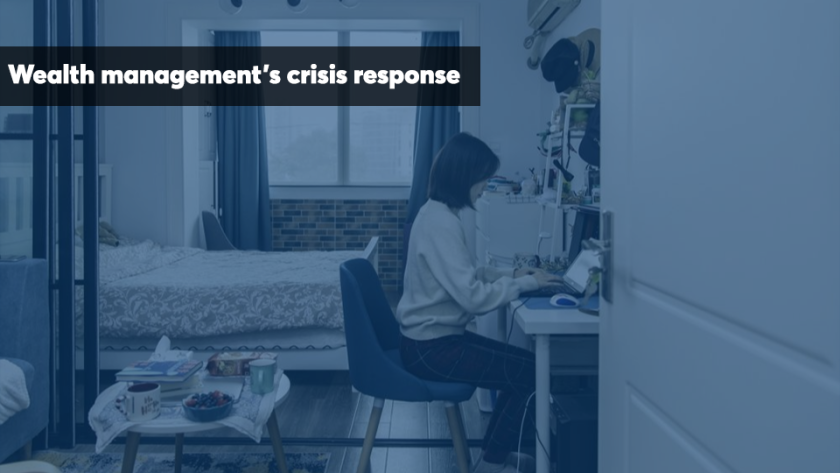The coronavirus dealt financial advisor Zachary Edwards about two weeks of body aches, fatigue, high fevers and a nasty cough — along with a four-hour trip to the emergency room.
Even though he was sick, the Davenport, Iowa-based Waddell & Reed representative kept working and keeping in touch with clients as the economy fell into turmoil. Now that he’s feeling much better, he’s trying to warn others who live far from epicenters like New York.
“That's kind of the scary thing is, I’m generally a pretty healthy person,” says Edwards, 37. “People might have a false sense of security.” He has been relieved that his wife Leigh, other teammates in his office and the rest of his friends and family haven’t shown any symptoms.
Edwards fell ill in mid-March, as companies like Pershing, RBC, Jefferies Group and many large financial firms responded to cases of the coronavirus among their employees. As the pandemic spreads, the health and economic crisis is roiling almost every aspect of wealth management.
Edwards shared his story with the local Quad-City Times and Financial Planning to help people understand that the risk extends far beyond the states with the most cases, he says. He still doesn’t even know how he caught the virus, though his test came back positive on March 23 and a doctor informed him he very likely had COVID-19 five days earlier.
“I was kind of in shock,” Edwards says. “I was very surprised to be diagnosed with the virus.” He points to a trip to a bar with about a half dozen friends to see a band play on March 14 and a trip to the supermarket as possible times of transmission.
Millions of Americans have yet to receive their stimulus checks, leading progressives to demand reforms improving underbanked consumers’ access to the financial system.
As special IG for the Treasury’s allocation of $500 billion in aid, Brian Miller could look into funding for Fed credit facilities. But Democrats on the Senate Banking Committee questioned his independence.
Leaders of Congress’s tax-writing committees want employers to be able to continue providing health insurance to their furloughed employees and still qualify for tax credits.
After Edwards — whose five-member team has 900 clients and $175 million in client assets — notified Waddell & Reed’s regional manager, the firm closed the office and sent in a crew for a deep cleaning. In accordance with its continuity planning and guidance from the CDC, the firm also alerted office occupants and guests.
“We’re grateful that Zachary Edwards is well on his way to recovery. These are extraordinary times for all of us,” spokesman Roger Hoadley said in an email. “Our proactive approach to the management of issues surrounding COVID-19 put us in a position to quickly respond when Zach reached out to us.”
Waddell & Reed’s preparedness team and COVID-19 steering committee meet regularly to discuss safety and business continuity. The firm has closed its leased offices. Most of its independent offices have shuttered as well. Waddell & Reed has also announced its April 29 annual meeting will be fully virtual.
Organizations and firms are donating N95 masks, providing resources at no cost and taking steps to protect employees and practices nationwide from the spreading pandemic.
Edwards first came down with a high fever on March 17. At a walk-in clinic, he tested negative for the flu and was diagnosed with COVID-19. A week after the bar outing with friends, he developed a “very violent cough” that went on for more than a week, he says. Edwards took the first available test he could at a drive-through center.
While working from home, he needed to take breaks nearly every hour due to the fatigue, aches and other symptoms, Edwards says, noting how much the coronavirus is different from the flu.
“This lasts 11 or 12 days. Having a fever that long was miserable,” he says. “On the 23rd, when I felt absolutely miserable, I had six appointments that day. I kept working because the market was going haywire through those weeks.”
Three days later, he participated in a conference call he can now barely remember and noticed from a Garmin monitor he wears on his wrist that his oxygen levels had dropped to a dangerous level. He went to the ER, where doctors hooked him to an IV and released him hours later. In two more days, Edwards says he began making his recovery.
He avoided the fate of the tens of thousands of people who have died in the U.S. after testing positive for the coronavirus. Neither his wife Leigh, an advisor assistant in the Davenport office who is studying to become an advisor, nor the half dozen or so friends who went to the bar with Edwards earlier in the month have shown any of the telltale signs of the virus.
Edwards recommends that anyone ailing with the coronavirus stay as hydrated as possible and prepare themselves for extreme fatigue. The virus affects everyone differently, though, he says.
“I would encourage people to listen to their bodies and work if they can,” Edwards says, “but also make sure that they're getting plenty of rest along the way, too.”









